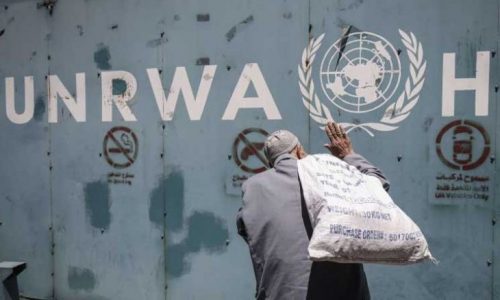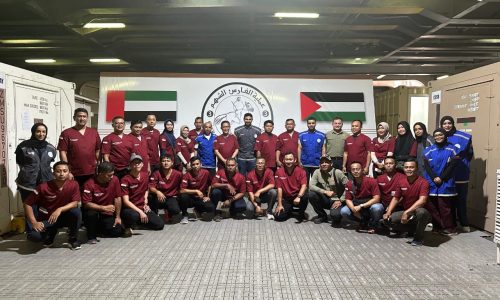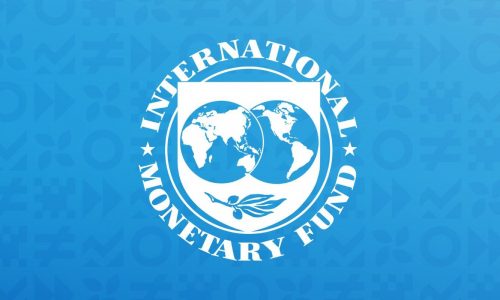Norwegian ship Statsraad Lehmkuhl docked at the Tanjung Priok Port, North Jakarta, on November 7, 2022, for its One Ocean Expedition in a sustainable future from a global perspective. The vessel is part of the Statsraad Lehmkuhl Foundation. The One Ocean Expedition kicked off in August 2021 and would last for 19 months.
Statsraad Lehmkuhl is a Norwegian barque-rigged training ship that was originally laid in 1914 in Bremerhaven, German Empire, under the original namesake Grossherzog Friedrich August. In 1920, as part of war preparations at the end of the World War I, it was given as a prize to the British Empire and was purchased by Norway’s Minister at the time Kristofer Lehmkuhl in 1921. By 1940, the ship was captured by Nazi Germany during its invasion to Norway in 1940 and was renamed Westwärts. After the war, in 1945, it was returned to Norway and is an active service ship as a training vessel.
The One Ocean Expedition is also part of a UN Decade of Ocean Science project, an initiative to promote the ocean’s crucial role, and the relative importance of environmental challenges and human activities that could influence climate change and ocean acidification.
Promoting ocean sustainability
Statsraad Lehmkuhl started its voyage in August 2021, as a 107-year-old and 98-meter-long tall barque-rigged ship departed Norway on an ocean voyage around the world and will return by April 2023. By that time, the ship had sailed for more than 55,000 nautical miles and visited 36 ports around the world.
The vessel is equipped with modern instrumentation to collect high-quality data on ocean physics, chemistry and biology during its travel. It will be a floating university that brings crews of students and young leaders together on different legs. During port visits, the ship will organize meetings and public events, that will inspire and engage scientists and citizens toward sustainable development worldwide.
“The excellent cooperation with Kongsberg has been crucial to Statsraad Lehmkuhl. It has provided us with many equipment such as propulsion, energy battery bank, radars, navigation and power equipment,” General Manager Haakon Vatle told Indonesia Business Post on the decks of Statsraad Lehmkuhl on November 7, 2022.
The goal of the One Ocean Expedition is to create initiative and attention, and share knowledge about the ocean’s vital role in a sustainable future from a global perspective. The voyage and project are recognized by the UN Decade as a tool for outreach, inspiration and engagement for the ocean. Thus, will contribute to the Societal Outcome 7 of the Decade: An inspiring and engaging ocean.
Contributions to SDGs
The One Ocean program recognizes Norway as a seafaring nation with a long tradition and history, and places itself to use the knowledge and resources to create a sustainable maritime future and global solutions. The project will contribute to the UN’s Sustainable Development Goals, such as SDG 4 (Quality Education), SDG 13 (Climate Action), SDG 14 (Life Below Water) and SDG 17 (Partnerships for the Goals).
Even regional seas give a relative importance to the differences in environmental challenges and human activities vary, which will unite the global citizens in building and exchanging knowledge for a sustainable ocean. The project also believes that we share a common future, common challenges in climate change, and ocean acidification that affects parts of the ocean. Working together, it demonstrates the essence of sustainability challenges and the role of the ocean in global sustainability.
Meanwhile, the sailing ship is believed to be an environment-friendly way of traveling because it is equipped with an electric generator. On the other hand, Kongsberg also provided other facilities on the ship as they support the One Ocean Expedition in the long-term to promote sustainability.
Indonesia-Norway collaboration
Both Norway and Indonesia are dependent on healthy seas and oceans for the countries’ well-being and growth, and responsible use of the oceans is a key part of the heritage.
Norway Ambassador to Indonesia Rut Krüger Griverin said the arrival of the ship was planned to create a collaboration between the two countries in maritime sustainability to ensure ocean health and wealth.
According to Vatle, the arrival of the ship is to create attention but also to create hope that it is possible to make a change and have funds to manage the ocean.
“The reason why we are here in Jakarta, why this route has been planned is also because of the collaboration between Norway and Indonesia. That is how we have been planning the whole circumnavigation,” Vatle told the press conference.
“The arrival of the ship is a special occasion and a fantastic opportunity in visualizing and celebrating Indonesia-Norway to the joint effort and joint commitment to our ocean… We see this in the name itself of the expedition, the One Ocean Expedition. Norway and Indonesia are both great sea-faring nations, the ocean is a vital part of both countries’ history and future. For centuries in Indonesia and Norway have lived by the sea and have profited by the sea,” Griverin explained.
She added that the mission was to create joint efforts to preserve and rehabilitate blue-carbon resources, such as mangroves, which played a crucial role in the fight against climate change. Mangroves are also important to ecosystems for animals and fish, and food production in coastal areas.
Risk in ocean sustainability
According to the European Environment Agency in 2014, around 70% of the planet is covered by oceans and marine litter. About 10 million tons of litter, mostly plastic, ended up at the oceans. The origin of litter comes from land-based activities, such as oil rigs, sewage systems, leakage, spills and others. The plastic litter would break down into very small pieces and is carried by water currents and winds throughout the world.
Firstly, according to Sambhasan (2022) the result of unsustainable resources extraction increasing over time resulting in biodiversity losses, and the processing industry resulting in Green House Gas Emissions (GHG) affects ocean sustainability in the long run since there is still this kind of activities. Without government help regulating, this would cause unending damage to the environment.
Secondly, land-based pollution generated by the world population is generated and increasing, which directly impacts the oceans through landfills, water bodies, wind dispersal and direct disposal.
The weak legal and institutional frameworks of many countries around the world in waste disposal and recycling would be a prevalent problem and an ongoing matter for a foreseeable future. Thus, it is hard to maintain a sustainability effort when the majority of the world would have a weak legal system and institutional framework.









